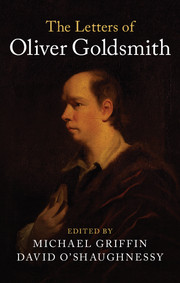23 - To George Colman, London, 19 July [1767]
Published online by Cambridge University Press: 12 December 2024
Summary
George Colman the Elder (bap. 1732, d. 1794), playwright and theatre manager, had his greatest success with The Clandestine Marriage (Drury Lane, 1766), which he co-wrote with David Garrick. Colman then became part of Covent Garden’s management team, along with Thomas Harris, John Rutherford and William Powell, in 1767. He committed £15,000 for his share of the royal patent and seems to have taken primary responsibility for managing the theatre's day-to-day affairs. Goldsmith had initially courted David Garrick of Drury Lane to represent his first play The Good Natur’d Man which he completed in spring 1767. Garrick's reluctance and objections had inflamed Goldsmith and so he sent the manuscript to Colman: his acceptance of the piece without his partners’ acquiescence may have been a cause of dispute between them, settled in a lawsuit in Colman's favour in 1769. The letter's expression of appreciation to Colman is heartfelt, as are the bitter references to Garrick's previous equivocation. Balderston notes that Goldsmith’s finances were in a parlous state as is evidenced by the fact that he had borrowed £10 from Newbery on a promissory note on 7 July, even though he still had a note of £48, dating from 11 October 1763, still unpaid. Goldsmith had refused to subjugate himself to Garrick's wish for flattery in order to get his play accepted and he also rejected the Drury Lane manager's suggestions for improvements to the manuscript. His willingness in this letter to accede to any amendments that Colman might request betrays his eagerness to have the play performed, or might indicate a desire to spite Garrick, whatever the cost.
The copy-text is the manuscript in the Victoria and Albert Museum, London. It was first published by Forster in 1848. It is addressed ‘To | George Colman Esqr. | Richmond.’ It is possibly postmarked 20 July although the ‘2’ is not clearly visible. The folio is also marked, in a different hand, ‘Dr Goldsmith to Colman’. Balderston notes that it was found among the papers of David Morris (1770?–1842) who gradually took over the management of the Haymarket from his brother-inlaw George Colman the Younger (1762–1836) during the 1810s.
- Type
- Chapter
- Information
- The Letters of Oliver Goldsmith , pp. 69 - 71Publisher: Cambridge University PressPrint publication year: 2018

